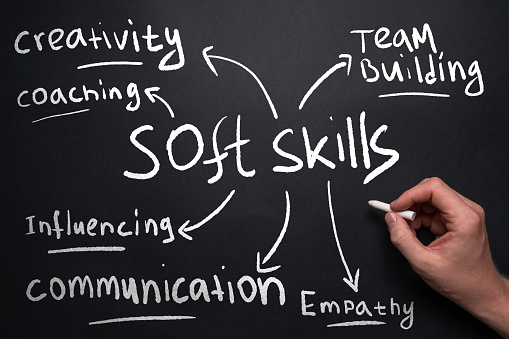Table of Contents
ToggleIntroduction
Soft skills are an important part of being a good manager. There’s no doubt about that. But what exactly are soft skills, and how can you improve them? Don’t worry: we’ve got the answers.
Soft Skills Definition
Soft skills are the “softer” skills that aren’t directly related to your job. They include things like the ability to work well with others, communicate clearly and effectively, and manage your time efficiently.
These skills are often overlooked by employers because they don’t look at a resume and see them listed under “soft skills.” But if you have them, not only will you be more effective in your role but also more likely to advance in your career.
Why Are Soft Skills Important?
You may think that soft skills are something that you learn in school, but the truth is that most people only take a few classes on how to communicate and interact with other people. The rest of your social skills are learned through trial and error (and many more errors).
There are a few reasons why these interpersonal skills are important:
- They help you get along better with other people, both at work and at home. This increases your happiness and allows you to be more productive when it comes time to do work.
- They will make you more marketable in other areas of life as well because they give you an advantage in any kind of job situation or career path
Commonly Lacking Soft Skills
When you are interacting with other people, there are a number of ways that you can improve your soft skills. Here’s a list of the most commonly lacking soft skills:
- Listening
- Empathy
- Communication
- Problem solving and problem identification
- Time management
- Teamwork and leadership
What About My Hard Skills?
It’s important to note that soft skills are important, but they’re not the only thing. Hard skills are also important!
Soft Skills Are More Important For Managers
If you’re a manager, your team needs you to be able to think on your feet and make the right decisions quickly. You need to know how to motivate them, which means having good communication skills. You’ll also have to be able to understand their strengths and weaknesses so that you can give them assignments based on what they can do best.
Hard Skills Are More Important For Employees
For employees, soft skills are not as critical as hard ones such as computer fluency or manual dexterity. It’s possible for an employee without good communication skills or interpersonal relationships with others at work (and beyond) still advance in their career—but only if they have other qualities like technical expertise or leadership potential that make up for it
5 Ways to Improve Your Soft Skills
- Be a good listener:Good listening is one of the most important soft skills when it comes to improving the way you interact with others. Your ability to listen attentively and carefully will not only help you develop strong relationships with your colleagues, but it will also make you more successful in your job search. To become a better listener, try these tips:
- Stop interrupting other people when they speak—wait until they’re done before adding your two cents.
- Pay attention to body language as much as what someone says verbally—if their tone or facial expressions change when speaking about something personal, take note! This could signal an opportunity for further dialogue on an important topic later on down the road!
- Ask clarifying questions if anything doesn’t sound right while listening intently; this shows that while doing so in order to fully understand where someone is coming from instead of assuming things based on stereotypes or assumptions made based solely upon gender/race/etcetera.”
Even if you are a “bad manager,” you can be taught soft skills.
You may have been told that soft skills are innate, but that’s not true. These skills can be taught and learned through training, leadership coaching, and experience. In fact, many of the world’s most successful managers were not born with natural leadership abilities—and they were able to take advantage of opportunities to improve their soft skills over time.
Soft skills are important for everyone who manages anyone else (which is pretty much everyone) because they help employees feel appreciated and supported so they can do their best work. They also allow leaders to develop trusting relationships with direct reports who will then be motivated to take on more responsibility at work.
Conclusion
Soft skills are an important part of your personal brand, and they can make or break your career. It is important to be aware of the soft skills you lack and work on them. There are many resources available online to help you improve such as books, courses, and workshops. Keep in mind that even if you are currently a “bad manager” or employee, there is still hope for improvement!
Also Read: 4 Things Your Business May Require
Shashi Teja
Related posts
Hot Topics
Understanding TruthFinder’s Background Check Features
Background checks have become increasingly relevant for personal safety and information gathering in digital environments. TruthFinder offers comprehensive background check…
How MLOps Is Shaping the Future of AI in Business
Artificial intelligence (AI) has evolved from a futuristic idea to a strategic necessity for companies looking to innovate, grow, and…



